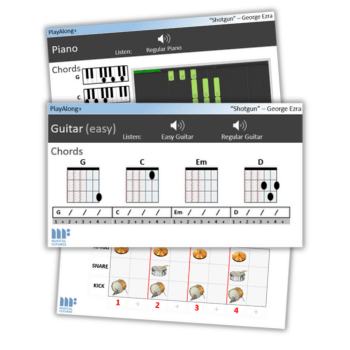Ask The Expert – Singing In Secondary Schools

Michelle James advises two teachers who are keen to make singing work within the secondary curriculum…

Is it possible to incorporate singing into different subjects across the KS3 curriculum – and what to do when a school removes one of the few opportunities for communal singing it has?…
Cross-curricular childishness?
I teach maths in a small, rural secondary school (Y7-Y11). The kids in my classes are great in terms of behaviour – and an absolute pleasure to be around – but where we struggle is in overcoming a certain amount of apathy regarding learning in general, and maths in particular.
We manage to get good results, but not without plenty of booster classes and intense revision before exams, and it makes me a little sad that really deep understanding isn’t always happening. I am also parent to a seven-year-old, who is currently being taught by an NQT with a passion for music. She has injected songs and singing into all her teaching, including of maths, and I have noticed my son noticeably more engaged as a result.
I’d love to try something similar with my KS3 (and even KS4) students – but would they really be open to something so ‘childish’? And could it actually make a difference, anyway?
A: Firstly, it’s great to hear that your son has become more engaged as a result of singing, which chimes with what we know about singing triggering endorphins in the brain that make us more receptive to learning new things.
There’s no reason why these benefits should just be enjoyed in primary school; it’s about creating and nurturing an environment where young people have access to engaging, appropriate repertoire they can sing well.
Doing anything well, and finding ways to express oneself both individually and collectively, reminds young people that they are capable of anything. In addition to this, bursts of song focus the mind, paving the way for deeper engagement at school – and better concentration and performance all round.
There are only positives to singing at secondary school. Songs and music cement identity, boost confidence and make us feel united – all fundamentals for high achieving, successful schools with a strong, cohesive culture.
Music and mathematics are, in fact, closely linked. Both involve patterns, sequences and intervals and utilise similar cognitive processes. As a secondary school maths teacher with an interest in song, the possibilities are abundant since music can be a shortcut to understanding mathematical concepts.
Start with your Year 7s, who will be used to singing across the curriculum at primary school, and just keep them singing! Try games involving layered pulse, rhythm and time signatures. Pupils who partake in musical activity are found to be higher achievers, so you will be setting them in good stead.
Bring back assembly!
The school where I have worked for the past 15 years (teaching RE and sport) recently converted to an academy, as part of a small, local MAT. Naturally this has meant quite a lot of changes, but we knew that some quite drastic action was needed in order for us to improve.
However, during this year’s Easter break a memo was sent out, informing us that in order to ‘maximise teaching and learning time’, our long-standing tradition of a daily assembly including notices, a short period of quiet reflection and a song – usually a hymn, but non-denominational – is to be replaced by ‘form time’, with no quiet time or singing.
I am very concerned by this, as I feel that singing together is far from a waste of curriculum time and actually plays a very positive part in promoting a sense of community within the school.
Do you have any evidence I could present to the SLT in order to support my argument, and perhaps help reverse the decision?
A: It’s sad to hear you won’t be coming together daily any longer, as the whole school uniting does bolster a sense of school community and all of the positives that brings. Saying that, this could be an opportunity for some reinvigoration of singing and music in your school. A time of change is an ideal moment to work towards a cohesive school community and identity, and singing is a brilliant way to achieve this.
I have sympathy with the underlying issues that motivate changes like these. There are huge pressures on schools to improve and countless subjects jostling for prominence, or as is too often the case with music and singing, to even get a look-in. This short-sightedness can lead to a deficiency of opportunities for young people and musical learning becomes a minority activity for those lucky enough to receive private tuition – especially biased against those from disadvantaged backgrounds.
Without access to singing at secondary school, how are students able to make choices around whether or not they want to pursue it? Too often, by the time they’re expected to choose their GCSE subjects many will already feel alienated from music and singing and think it’s something ‘other people do’ – a bleak outlook for those that haven’t even finished their education.
The ironic thing about this is that as well as raising attainment and self-esteem, music provides a credible and extensive universal language that helps cultivate confident, articulate and reflective individuals – exactly what we would want for our young people.
The first step is to present your argument for providing singing opportunities at school, matching up the ethos of the MAT with the benefits we know you get from singing – unity, a sense of worth, community spirit (as you say), wellbeing and improved learning.
The second is to work with your school to find the place in which it belongs. Our advice would be to offer a range of singing opportunities, such as choirs, music lessons, student-led groups (you might use Young Singing Leaders), and band/song-writing clubs. Singing is also an ideal reason to join together with your fellow academies.
Remember that singing is a great way to celebrate achievements outwardly, including to parents, governors and stakeholders. When you achieve the improvements in the pipeline, it will feel all the more inspiring to sing about it! Good luck.
Michelle James is the CEO of Sing Up; for more information, visit www.singup.org or follow @SingUpTweets











